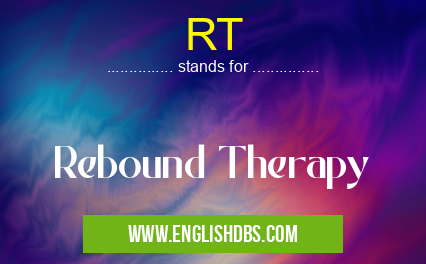What does RT mean in MEDICAL
Rebound Therapy or RT is an important therapeutic intervention for physical, emotional and mental wellbeing. It is a form of therapy that uses trampoline surfaces to help those with special needs achieve greater mobility, balance, and psychological well-being. Rebound Therapy provides a safe and fun environment for individuals to learn motor skills in a way that is challenging yet encourages success. This therapy has been used for individuals of all ages and conditions including autism spectrum disorder (ASD), cerebral palsy, developmental delays, sensory processing issues, genetic disorders, traumatic brain injury (TBI) and Down Syndrome.

RT meaning in Medical in Medical
RT mostly used in an acronym Medical in Category Medical that means Rebound Therapy
Shorthand: RT,
Full Form: Rebound Therapy
For more information of "Rebound Therapy", see the section below.
What it is
Rebound Therapy utilizes rebounders or mini trampolines which are specifically designed to provide the user with feedback through an exaggerated bouncing sensation as they move their bodies across the surface. The sensation helps the individual gain better awareness of their body position and movement in space while also providing them with sensory stimulation. This therapy can be done both individually as well as in group settings providing numerous health benefits.
Benefits of RT
Rebound Therapy benefits those who have difficulty focusing or who become easily distracted as it allows them to stay engaged during activities while also providing them with multiple levels of motivation throughout their session. Furthermore, Rebound Therapy helps increase muscle strength by utilizing the natural springiness of the trampoline surface to challenge muscles without overworking them beyond capacity. It also assists in developing motor planning skills which helps to improve coordination by teaching individuals how to efficiently sequence movements such as jumping and hopping from one foot to another. Additionally, this type of therapy gives those who participate time away from their everyday routine where they can practice gross motor skills like running and jumping in a safe space making it an especially attractive intervention for those who cannot get outdoors due to mobility issues or lack of access to recreational spaces.
Essential Questions and Answers on Rebound Therapy in "MEDICAL»MEDICAL"
What is Rebound Therapy?
Rebound Therapy (also known as trampoline therapy) is an active form of physical therapy that involves bouncing and rebounding on a special trampoline in order to improve physical, cognitive, and emotional abilities. It was developed by physical therapist Dr. Morton Galinat and has been used to help individuals with disabilities since the 1970s. The use of a trampoline provides a low-impact way for people with limited mobility or impaired balance to move, as well as providing sensory stimulation and improved coordination.
How does Rebound Therapy help with disabilities?
Rebound Therapy helps individuals with disabilities by improving muscle tone, coordination, balance, strength, posture, range of motion, agility, and reflexes. It can also help reduce spasticity (involuntary muscle contractions), provide sensory integration activities, improve body awareness and fine motor skills, and promote relaxation.
Who can benefit from Rebound Therapy?
Rebound Therapy can be beneficial for people of all ages across many different populations including those living with autism spectrum disorder (ASD), ADHD/ADD, cerebral palsy (CP), Down syndrome (DS), learning disabilities (LD) or intellectual delays/disabilities (ID), traumatic brain injuries (TBIs), and developmental delays.
Is there any risk involved in using a trampoline for therapy?
While using a trampoline comes with inherent risks due to the nature of the activity it should be noted that there is no greater risk associated with using it for therapeutic purposes when conducted properly under qualified supervision. The risk of injury is greatly reduced when careful safety precautions are taken to ensure that correct posture is maintained throughout the session.
What kind of trampolines are used in Rebound Therapy?
Therapeutic trampolines are specially designed to meet the needs of individuals requiring rehabilitation from an accident or illness while providing optimal support to ensure safety during activity on the rebounder. The supportive structures such as hand rails may vary depending on the individual's level of ability but generally include more than four metal legs connected by springs allowing safe vertical movement up to one meter high off the ground when jumping or running on them.
Who administers Rebound Therapy?
Professional therapists such as physiotherapists administer Rebound Therapy sessions on behalf of their patients. Depending on individual circumstances an occupational therapist may also provide assistance during these sessions in order to maximize benefits achieved through this type of rehabilitation program.
Final Words:
Rebound Therapy offers numerous physical and cognitive benefits for individuals with disabilities but can be adapted for anyone looking to improve focus and coordination skills while having fun doing so! It’s particularly helpful for children who may find traditional physical therapies unappealing since there’s no pressure involved – just playful bouncing around! So if you’re searching for new ways to keep yourself or someone you care about active, strong, mentally alert then Rebound Therapy might be right up your alley!
RT also stands for: |
|
| All stands for RT |
